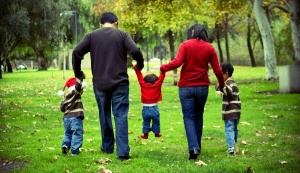 Over the years, various researches have been conducted on child’s behaviour and many of them indicate that the development of a child’s behaviour is very strongly influenced by his or her family. We, as parents, often tend to ignore the fact that children also learn a lot at their homes, not just at schools. Merely getting our children enrolled in one of the top schools of the country does not relieve us of our duty to provide them such an environment where they can experience their proper development.
Over the years, various researches have been conducted on child’s behaviour and many of them indicate that the development of a child’s behaviour is very strongly influenced by his or her family. We, as parents, often tend to ignore the fact that children also learn a lot at their homes, not just at schools. Merely getting our children enrolled in one of the top schools of the country does not relieve us of our duty to provide them such an environment where they can experience their proper development.
The Family Pediatrics Report (2003) specified that, “Families are the most central and enduring influence in children’s lives regardless of their education, composition, income, or values” (introduction section, para.1).
Thus, it would be right to state that as parents, it should be our greatest endeavour to help children have a positive development, and we should not disregard the fact that family does have a great impact on a child’s behaviour and development.
Some of the family aspects that need our consideration, when it comes to influencing a child’s behaviour, are:
The Family Environment

Children, in their early childhood, learn a lot from the immediate environment they are a part of. The environment that you, as a family, provide to your child strongly influences their behaviour and holistic development. Parents, who happen to fight with each other in front of their children, have been found having children with aggressive behaviour or a low emotional quotient. Whereas, parents who give their child a stable family environment, devoid of fights and arguments, mould their children into human beings that have a strong self-esteem, confidence and are high on discipline too.
Support and Love
We understand that you love your children. But, do you really show them that you do? When it comes to your children, it is important to understand that they are fragile and need attention. They covet your love and care. So, nurturing relationships in a family are extremely important for the healthy development of a child. Parents who make their children feel safe, secure, and loved in their families; help them be more confident, responsible and socially active.
Parenting Practices

Parents need to take an active participation in their children’s activities. If your child loves to visit the outdoors, then accompany him or her to the nearby park and have a game of football. This will not only help in the right physical and mental development of your child, but he or she will be able to develop a strong sense of self within them. Studies have revealed that those parents who follow positive parenting techniques and practices such as spending time with their children, reading to them, taking them out for regular walks, helping them with their school work, etc. assist in bringing the right developmental outcomes in their children.







 Over the years, various researches have been conducted on child’s behaviour and many of them indicate that the development of a child’s behaviour is very strongly influenced by his or her family. We, as parents, often tend to ignore the fact that children also learn a lot at their homes, not just at schools. Merely getting our children enrolled in one of the top schools of the country does not relieve us of our duty to provide them such an environment where they can experience their proper development.
Over the years, various researches have been conducted on child’s behaviour and many of them indicate that the development of a child’s behaviour is very strongly influenced by his or her family. We, as parents, often tend to ignore the fact that children also learn a lot at their homes, not just at schools. Merely getting our children enrolled in one of the top schools of the country does not relieve us of our duty to provide them such an environment where they can experience their proper development.


























